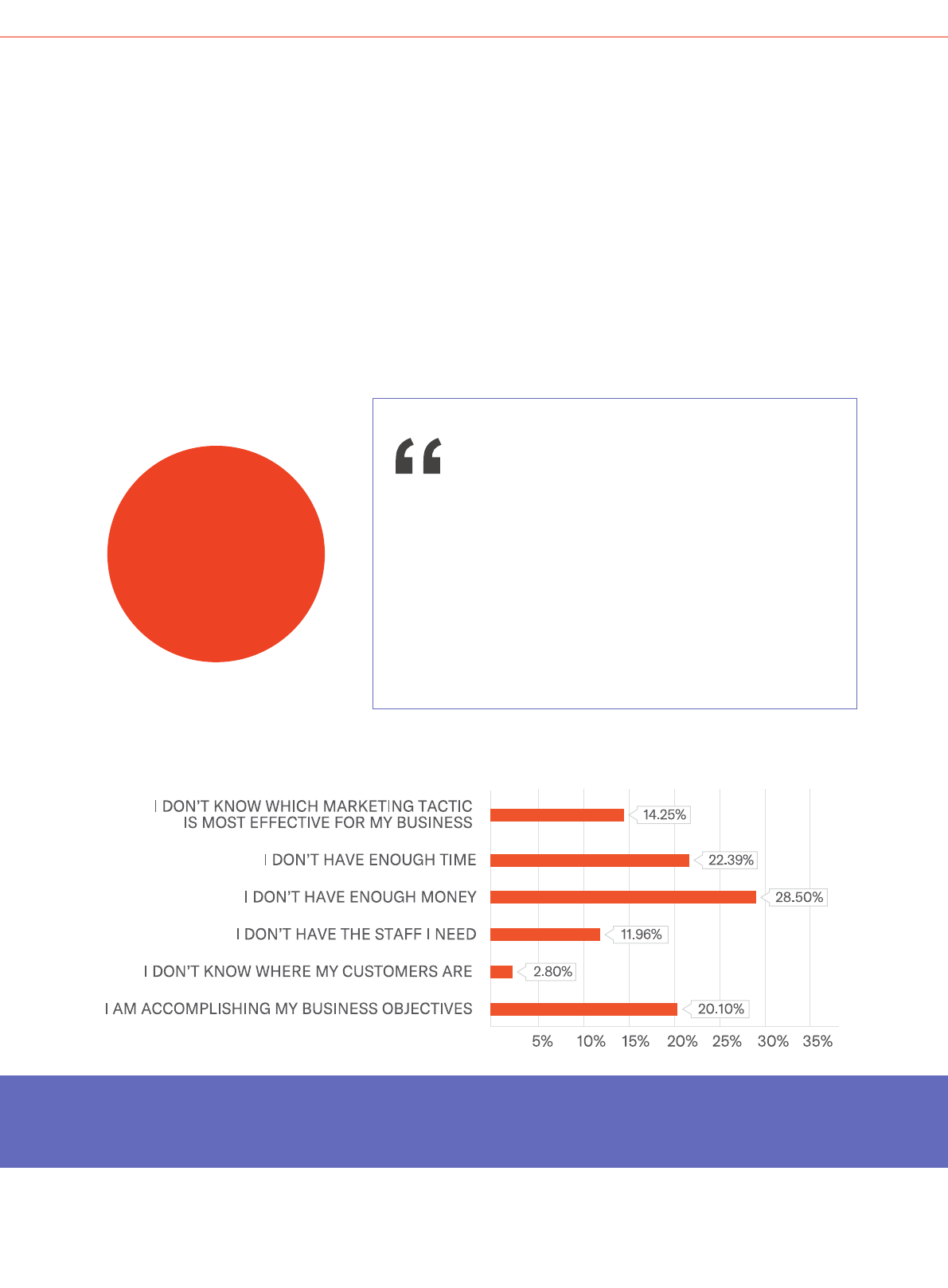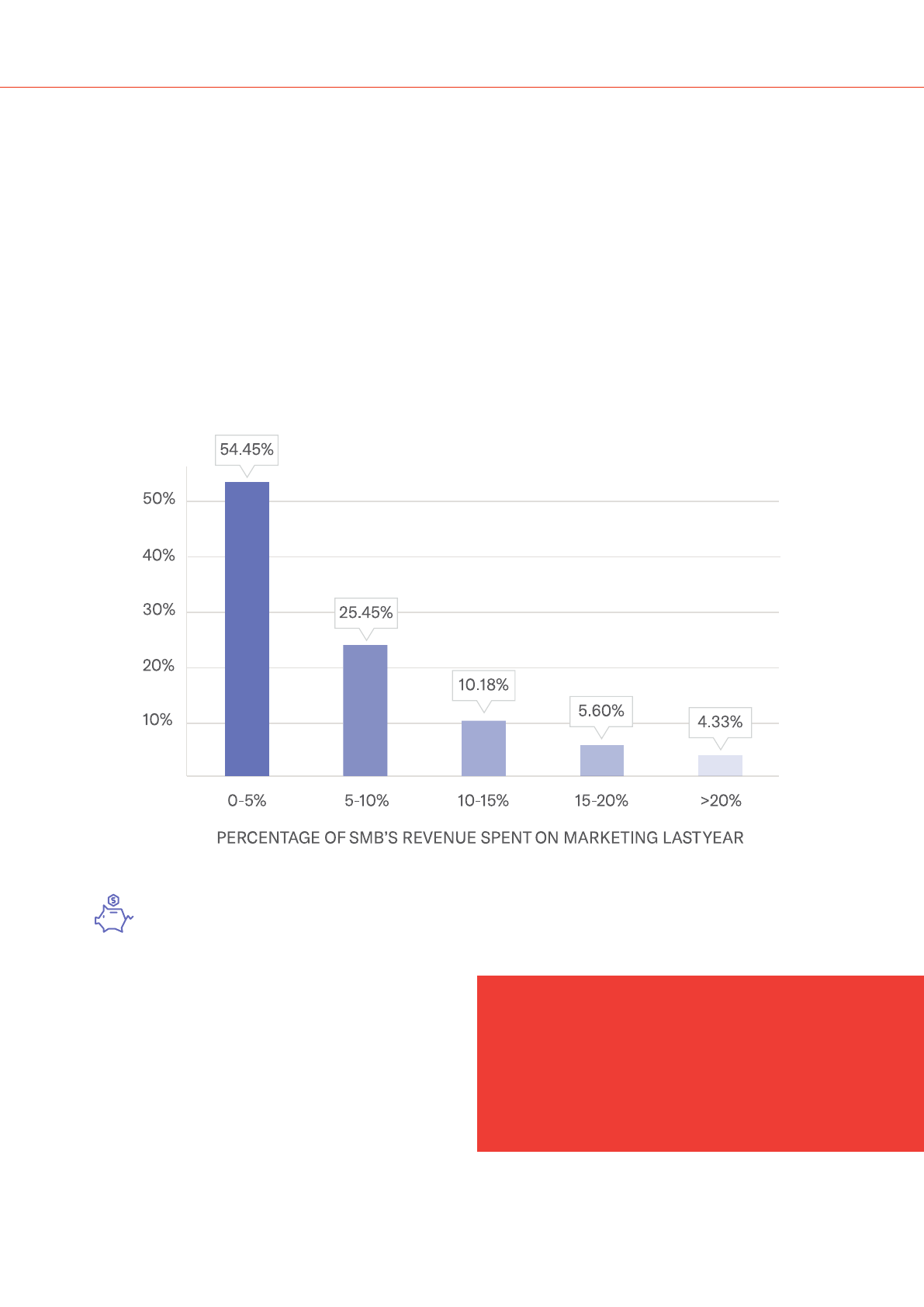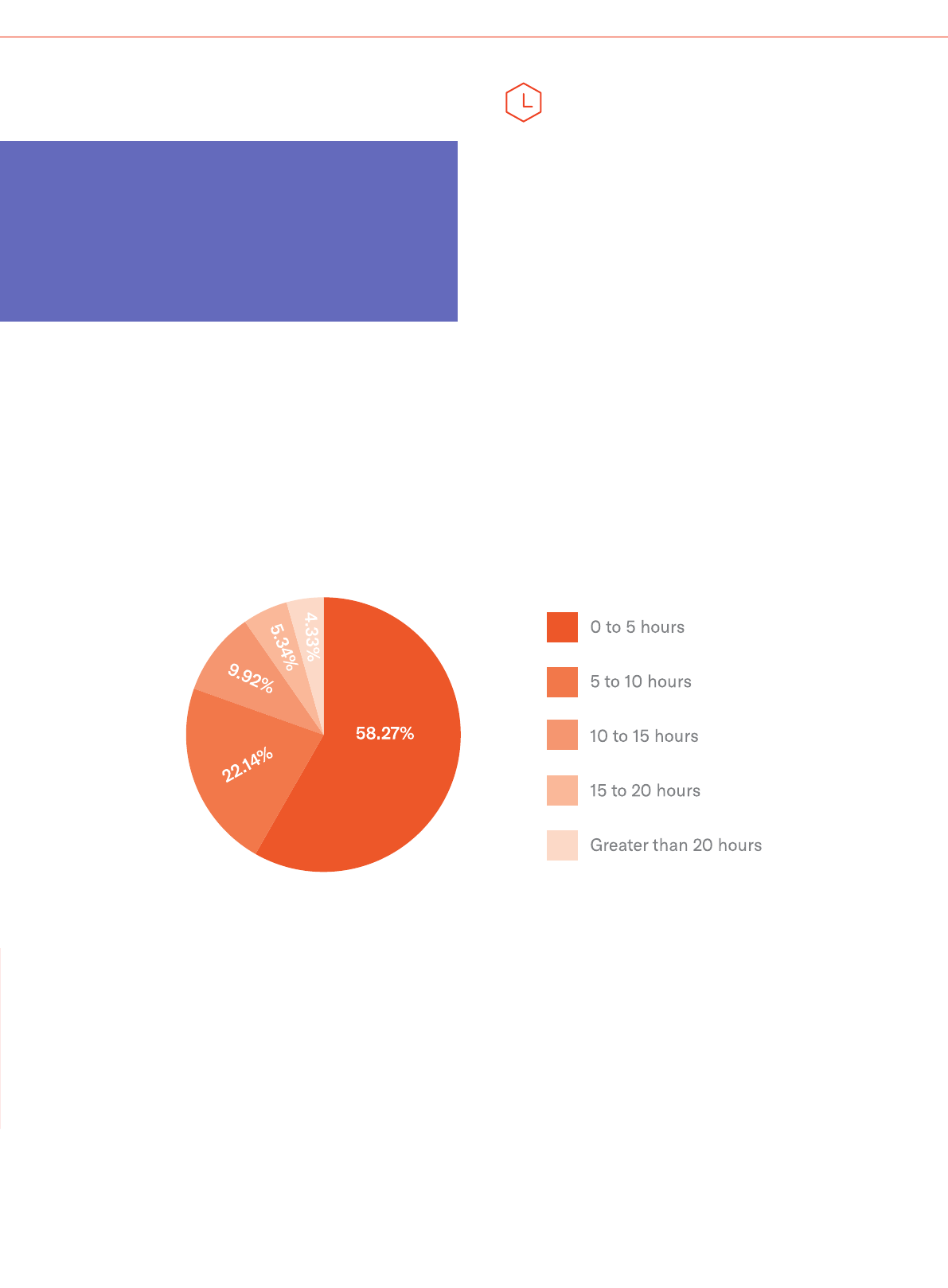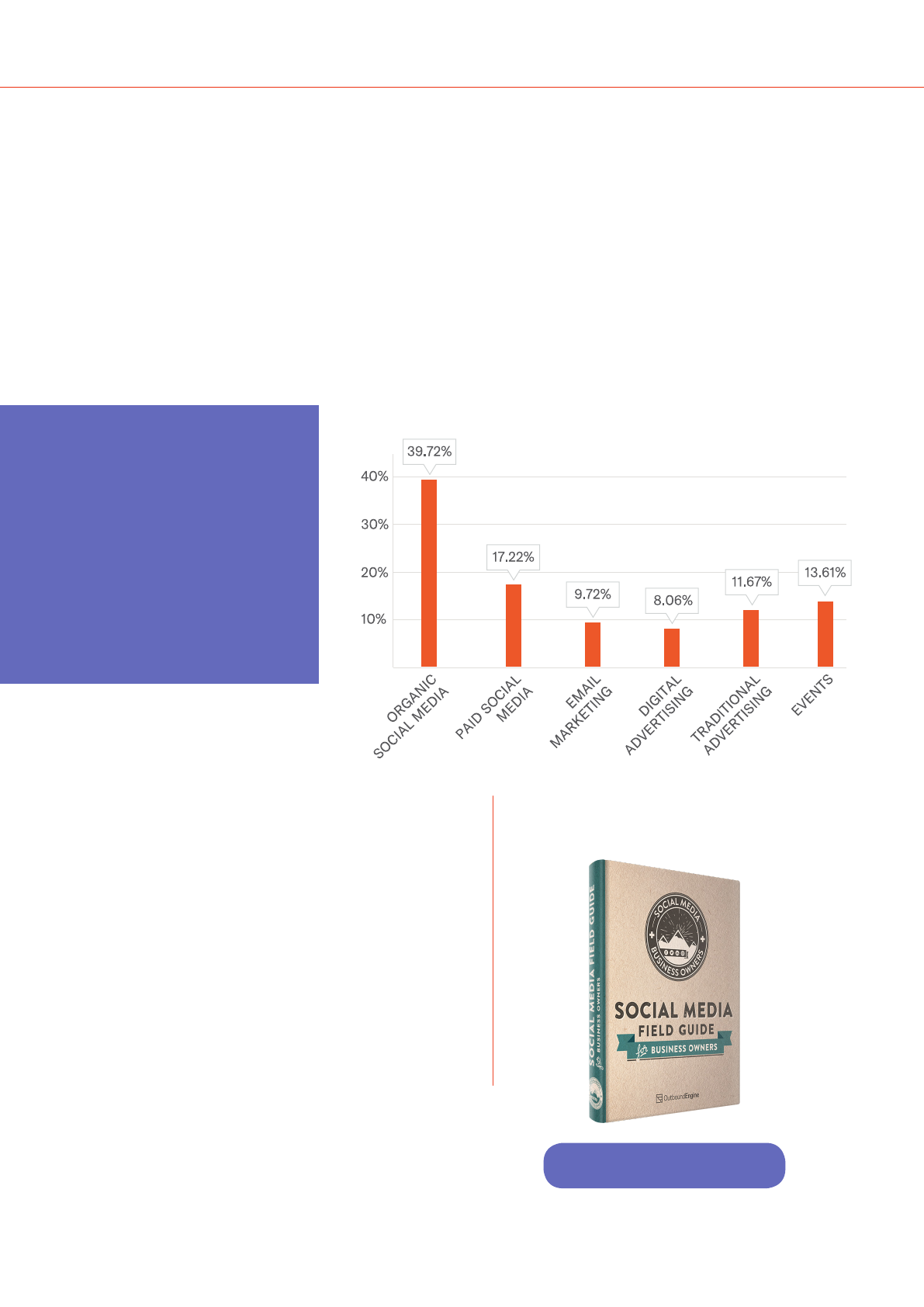
Stress, Time &
Growth: Factors
Affecting
Small Business
Marketing in 2019

The majority of business owners are not marketers by trade. They are
pursuing a dream, passion or a practical skill they’re exceedingly good
at. Yet the complexities of operating and marketing a 21st century
business of any size are frequently incompatible with the preferences of
today’s business owners, creating and exacerbating stress.
In February 2019, OutboundEngine, a leading provider of marketing
automation software for small businesses, conducted a survey of more
than 350 small and medium business (SMB) owners throughout the U.S.
We asked them about revenue growth, stress, what is prohibiting them
from meeting their business goals, which marketing tactics were most
effective for them in 2018, and more.
Executive Summary
27% of SMBs feel more stressed about
their business this year than last year.
50% percent of respondents do not have
a marketing plan for 2019.
Key Findings & Figures
Of the SMBs owners who spend the
least time on marketing, 36% are
unsure how they are going to grow their
business in 2019.
86% of respondents prefer to spend
their time on other business activities
than spending time on their marketing.
02
2019 OUTLOOK: FACTORS AFFECTING SMALL BUSINESS MARKETING

Small Business Stressors & The 2019
Marketing Ecosystem
Operating a small business is more difficult than ever. As a result, small business owners are
much like nearly every other American demographic: stressed. Stressed about keeping existing
and getting new customers, stressed about staying on brand. Overwhelmed at the sheer number
of options and choices presented to them across every area of business, especially marketing.
SECTION I:
Stress and small business marketing frequently go hand-in-hand. A lack of knowledge of
business-specific marketing tactics correlates to higher levels of stress in small business
owners.
Owning a small business is a huge commitment that
necessitates constant attention and awareness.
Most commonly, marketing is the key factor that
either drives growth or causes a business to be left
behind. There are now numerous technologies to
help small businesses automate their marketing, but
even those take a weekly commitment that small
business owners just don’t have time for.
– Marc Pickren, CEO, OutboundEngine
62%
OF SMALL BUSINESS
OWNERS ARE AS OR
MORE STRESSED ABOUT
THEIR BUSINESSES
IN THAN THEY
WERE IN .
What is prohibiting you from achieving your business objectives?
03
2019 OUTLOOK: FACTORS AFFECTING SMALL BUSINESS MARKETING

The number of marketing channels through which business owners can engage with new and
existing customers grows every year. Business owners are then forced to compete for visibility
through traditional brick-and-mortar locations as well as an expanding digital marketplace, yet
prefer to spend time and money on other elements of their businesses – not marketing.
As you can see from the charts below, marketing is often a much smaller size of an SMB’s
budget. However, those SMBs that did invest time on marketing reported more growth than
those who devoted less time.
How SMBs Use Marketing Today
SECTION II:
Nearly 55 percent of SMB owners spend
less than 5 percent of annual revenue on
marketing.
Eighty-one percent of respondents who
invested between 5 and 10 percent of
annual revenue in marketing said they
experienced revenue growth in 2018,
compared to just 50 percent of respondents
who invested less than 5 percent of
revenue.
Even a small increase in
marketing investment led
SMBs to see more revenue
growth in 2018 than those who
spent less on their marketing.
04
2019 OUTLOOK: FACTORS AFFECTING SMALL BUSINESS MARKETING

More than 58 percent of SMB owners
spend five hours or fewer on marketing
every week.
More than 79 percent of respondents who
spent between five and 10 hours per week
on marketing reported revenue growth
in 2018, compared to just 52 percent of
respondents who invested fewer than five
hours per week on marketing.
Of SMB owners who spent the
least amount of their time on
marketing, 47 percent did not
experience revenue growth in
2018.
Small business owners prefer to spend their time improving operations (36 percent) and helping
customers solve their problems (28 percent). However, respondents who invested slightly more
time or money in marketing also reported revenue growth at higher rates.
Marketing’s complexity can paralyze small business owners, especially those who don’t like
marketing in the first place or know how to get started.
Nearly half of SMB owners surveyed do not have a marketing plan for 2019, while nearly 25
percent of respondents are unsure of how they plan to grow their businesses in 2019. Perhaps
unsurprisingly, nearly 75 percent of small business owners who have no concrete growth plans
don’t have a marketing plan.
It’s been a long-held view among marketers and business owners that the more money and time
you spend on marketing, the greater the output. It’s been the path of least resistance for so
long. But you don’t have to spend more to get more. Our data shows that a time investment as
low as 5 percent can influence revenue growth.
Time spent on marketing per week
05
2019 OUTLOOK: FACTORS AFFECTING SMALL BUSINESS MARKETING

Effective Marketing Strategies &
Opportunities for SMBs
SECTION III:
SMB owners value social media engagement across paid and organic, and view events and
email marketing as useful tools to nurture existing customers and acquire new ones. Prioritizing
these marketing channels is a crucial first step in building a cost-effective strategy that
maximizes results with minimal effort.
Nearly 40 percent of
respondents view organic
social media posts as
the most successful
part of their customer
marketing strategies,
followed by paid social
posts (17 percent), events
(13 percent) and email
marketing (9 percent).
Benefits of utilizing a
comprehensive social media
strategy:
1. Increased exposure for brand/business
2. Increased traffic to social pages & website
3. More frequent interactions with customers
4. Greater top-of-mind awareness and recall
for potential customers
5. More exposure as a thought leader or
subject matter expert
6. Expanded referral networks
7. Opportunity to become a social business
with which people want to interact and
have a relationship
Ready to dig into your social media
marketing plan? Download our free
guide here:
Read More
In 2018, where did you find the most
success when marketing to customers?
06
2019 OUTLOOK: FACTORS AFFECTING SMALL BUSINESS MARKETING

Even with the numerous benefits of building a thorough social media strategy, SMB owners
still don’t have enough time to spend on it. Among respondents who find the most success
with organic or paid social, as well as email or digital marketing, the majority of each subset
of owners still prefer spending time making sure their business runs smoothly instead of
marketing.
That is likely due to the time-suck of particular marketing channels combined with the
nature of small business ownership. For example, SMB owners recognize the value of paid
and organic posting, but can’t allocate enough time to the related tasks to efficiently deliver
on its potential value and ROI.
In fact, of those who say organic social media is their most successful marketing tactic (41
percent), 52 percent also say it is the greatest time suck.
It is a common misconception that social media will replace human interactions.
As a small business owner, you must build relationships both in-person and
online to maintain relevance with your consumers throughout their buyer’s
journey. Social media will help you nurture leads and generate more engagement
while you are busy running your business.
– Deepak Surana, SVP of Product, OutboundEngine
13%
PAID SOCIAL MEDIA
15%
EVENTS
52%
ORGANIC
SOCIAL MEDIA
Which marketing tactics are the greatest time-suck for SMBs?
Despite social media’s necessary time investment, respondents who listed organic social
media as their most successful marketing tactic in 2018 also say that to grow their business
in 2019, they want to expand their social media presence (47 percent).
07
2019 OUTLOOK: FACTORS AFFECTING SMALL BUSINESS MARKETING

Best Practices & Takeaways
SECTION IV:
This report has yielded interesting insight into business owners’ preparedness and
appetite for marketing to existing and new key customer segments, as well as stressors and
preferences that inhibit the development and execution of marketing strategies.
Building a formal marketing plan is the next logical step for SMBs. Yes, it can take time
away from the other elements of the business that owners would rather be doing, but
if SMB owners take the time to answer a few questions and identify key goals, they
can establish a marketing plan that will help them meet their objectives. Marketing is
complicated -- and is getting more complicated every day. Establishing some basic goals
and targets will at least set some parameters around what they are trying to accomplish.
Elements of a Marketing Plan:
How do you want to grow?
Nearly 25 percent of
respondents were unsure
of how they wanted to grow
their businesses. This crucial
question should be answered
first, as it will dictate the rest of
your marketing plan.
PART 1:
Are your business goals tied to
your marketing goals?
Identify your short- and long-
term goals—as simple or as
complicated as you’d like—then
determine how marketing can
support them.
PART 2:
Have you identified your target
audiences and what matters to
them?
Knowing who you want to reach
and why will help you know
which marketing channels can
reach them best.
PART 4:
Do you have a marketing
budget established?
Establish a budget for your most
potent marketing channels that
will help you achieve those
goals, otherwise, you will risk
underfunding the areas that
can help your business grow.
PART 3:
08
2019 OUTLOOK: FACTORS AFFECTING SMALL BUSINESS MARKETING

Even answering these questions might be challenging, and SMBs might be asking how they
are supposed to confidently execute on these tasks when they are not marketers by trade.
It’s a valid question, and it’s the reason OutboundEngine exists in the first place. Small
business marketing can be complicated even at its simplest and can make SMB owners go
to bed and wake up with pits in their stomachs day in and day out.
Marketing automation can address these challenges
directly. OutboundEngine, for instance, offers small and
medium businesses professional marketing services
that help eliminate some of the stresses of operating a
business.
Embracing marketing automation offloads the sustained
effort required to curate branded content for potential and
new customers, build social or email campaigns, maintain a
website, nurture customer relationships and more without
a corresponding increase in marketing budget or time
allocation.
The best part? Customer engagement becomes more
efficient, revenue increases and SMBs get to spend more time on the parts of their
business they care about most.
SMBs don’t have to do it alone. They can grow their business, generate new
customers, engage them with compelling content that matters to them and
achieve their business or marketing goals without breaking the bank. They
don’t need to hire a full-time marketing specialist or outsource to an expensive
marketing agency. OutboundEngine understands the value that email content,
social media, and SEO deliver, and we put the time in so SMB owners can get back
to the things they enjoy most.
– Marc Pickren, CEO, OutboundEngine
Marketing
automation software
has introduced a
new operational
framework for SMB
owners: spend less,
get even more.
09
2019 OUTLOOK: FACTORS AFFECTING SMALL BUSINESS MARKETING

Wrap Up
Methodology
In February 2019, OutboundEngine, a leading provider
of marketing automation software for small businesses,
conducted a survey of more than 350 small and medium
business (SMB) owners throughout the U.S. The survey
explored sentiment toward and knowledge of marketing
tactics, time management preferences and the stressors
and concerns owners feel about the future success of their
enterprises.
About OutboundEngine
Established in 2012 and headquartered in Austin, Texas,
OutboundEngine is a leading provider of B2B marketing
automation software that empowers small business owners
with actionable marketing campaigns. OutboundEngine’s
software enables businesses to maintain impeccable online
reputations, build stronger relationships, acquire new
customers and stay focused on what they do best.
98 San Jacinto Blvd, Suite 1300 | Austin, TX 78701
info@outboundengine.com | www.outboundengine.com
10
2019 OUTLOOK: FACTORS AFFECTING SMALL BUSINESS MARKETING
